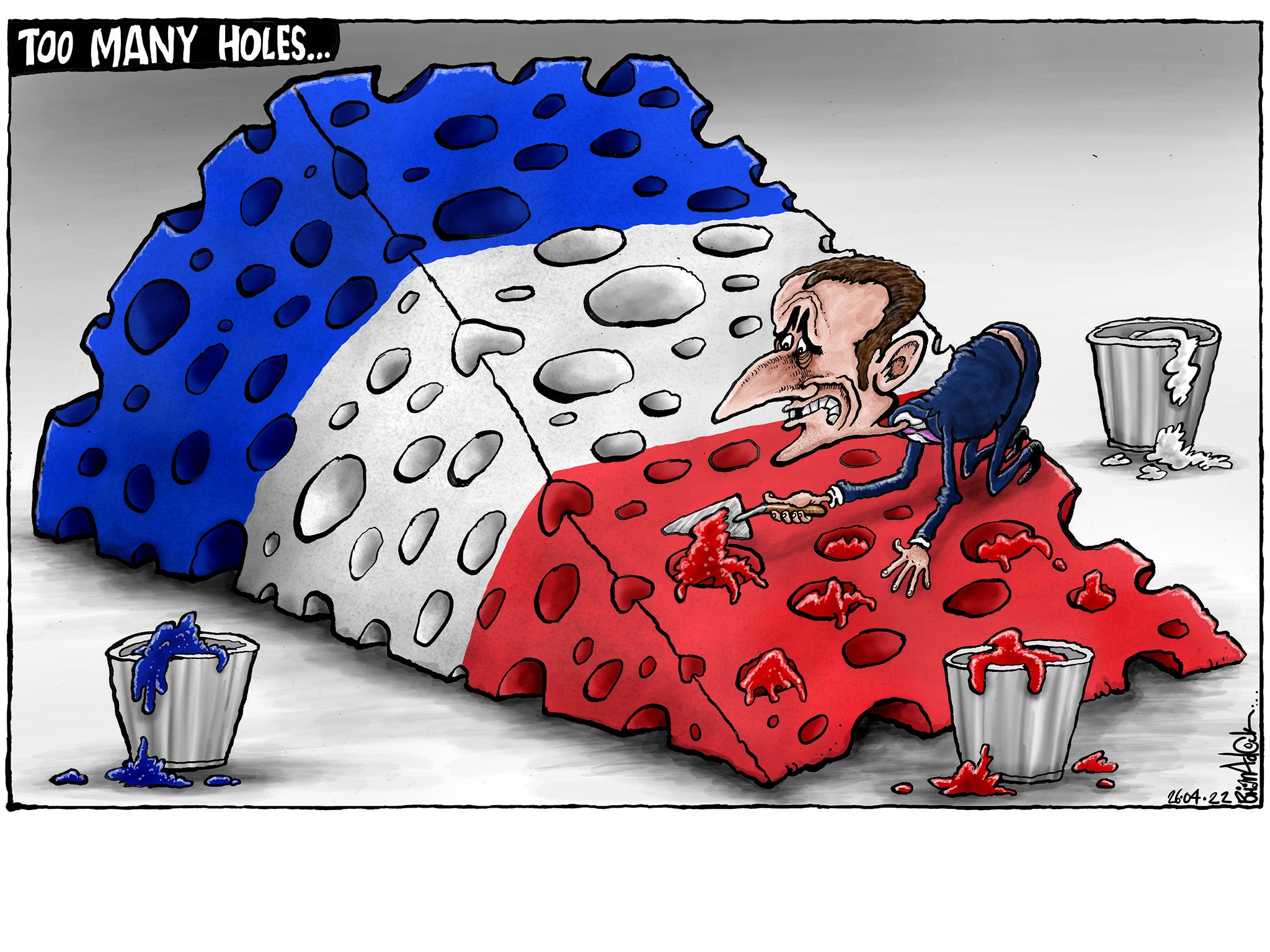The election may be over, but the struggle to preserve France’s values is not
Editorial: The next few years promise to be politically exhausting and economically difficult for France

Is the French glass half full or half empty? From the point of view of democrats the world over, there is a great temptation, and some good reason to take the optimistic point of view.
Only a few weeks ago, there was excited – and terrified – talk of a tiny lead for Emmanuel Macron over Marine Le Pen in the opinion polls. He was, after all, not a popular president even by French standards, and they seem to love to hate their leaders more than most.
After the “gilets jaunes” (yellow vests) protests, and continuing concerns about migration and the economy, Covid and the Ukraine war, there were plenty of anxieties and grievances about, and plenty to blame Mr Macron for – fairly or not. His aloof manner gave him the nickname “Jupiter”, and many French took his vaguely Tony Blair-esque centrist policies as only being good for the rich and minorities (albeit a contradictory perception).
There was much talk, again hopeful in some quarters, but as a warning in others, that Ms Le Pen could overhaul Mr Macron’s tiny poll lead and upset the pollsters and the establishment just like the Brexit vote and Donald Trump’s election. To top it all, Mr Macron hadn’t even bothered to do much campaigning.
Fortunately, when he did decide, at last, to go En Marche! himself, so to speak, some of the old Macron magic returned. Ms Le Pen was better in the television debate than last time round, when she got badly muddled up, but that would not be difficult. Her policies, a grab bag of mutually contradictory proposals, still don’t add up and, as the president pointed out with cool authority, threatened a civil war.
Her association with Vladimir Putin (including a Kremlin loan to her party) and the vestiges of her commitment to “Frexit” did the rest. The French seemingly peered over the wall and didn’t like what they saw. Enough of the centre-left and centre-right voted for Mr Macron to see off the neo-fascistic challenge, and by a surprisingly comfortable margin. For democrats and friends of France, it might be said the glass is about 58.5 per cent full.
Still, though, France is divided, polarised and the struggle to contain left and right extremism is far from over. The immediate challenge for En Marche! will be the parliamentary elections in June. France has a powerful presidency in foreign and defence policy, but the national assembly has much more say on domestic issues – the ones that will really define the second term of Mr Macron’s presidency.
He and his colleagues will have to try and contain the wave of enthusiasm for the radical left and right parties, given that the mainstream left and right parties have suffered such a strange decline, as they have in other European democracies.
In France, although the old mainstream parties are in poor shape nationally, at the city and regional level they are still a force. The electoral system for MPs mirrors the presidential one – two rounds of ballots, which may help minimise the nationalist right surge in some areas, as it did nationally.
To keep up to speed with all the latest opinions and comment, sign up to our free weekly Voices Dispatches newsletter by clicking here
No doubt Ms Le Pen’s National Rally party will win many more seats in the parliament, whatever the electoral system, because they are ahead of where they were in 2017, the last time the seats were contested. They will surely make the president’s life more difficult, but if they get too many seats and the other parties of left and right also choose to be obstructive, then France is in for a renewed period of “immobilisme” where the president cannot get much done, such as raising the retirement age and boosting the economy.
Ms Le Pen’s supporters, in fact, have a vested interest in the failure of the Macron administration, so they can create and exploit fresh grievances for the 2027 presidential contest.
So the next few years promise to be politically exhausting and economically difficult for France. As the second largest economy in the eurozone, the country intimately connected to the single market and world trade, France is far from immune to the current global trend towards high inflation and low growth – stagflation – and there are no easy answers to these challenges, which in France have exacerbated significant social and racial divides.
Ms Le Pen, in other words, will have plenty to complain about in the coming years, and she has shown herself more than willing to promise bogus easy answers to every problem. The presidential election may be over, but the struggle to preserve France’s republican values is not.
Join our commenting forum
Join thought-provoking conversations, follow other Independent readers and see their replies
Comments
Bookmark popover
Removed from bookmarks